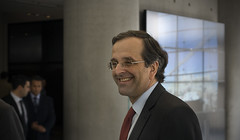 Image by Alex
Image by AlexMain opposition New Democracy (ND) leader Antonis Samaras on Monday repeated that consensus can be achieved only on the renegotiation of the memorandum terms using as a basis his party's economic proposal for kick-starting the economy through the adoption of lower tax indices.
Addressing ND's parliamentary group, Samaras ruled out "any thought of a consensus on the tax increases announced on Sunday by the prime minister", stressing that "an understanding on the taxation issue would have created the preconditions for a substantive discussion on a programme aimed at ensuring a rekindling of the Greek economy."
Referring to the medium-term programme sponsored by the government, the state news agency quoted him as saying that his party could give its approval to individual articles if they are put to a vote separately.
Samaras stressed that the pressures exerted raise an issue of democracy, pointing out that "we cannot consent to a policy that is wrong and leads to a dead end. Giving my approval when I disagree, while my criticism has been proved to be correct, would be equal to approving the abolition of political opposition and democracy. I will never sign the self-abolition of democracy and political opposition."
On the movement of the "indignants", he said that "the protesting citizens that gather every day in city squares call for dignity and a change of policy," adding that "we should listen to what they are saying because their movement has no political party affiliation, is peaceful, unifying and nationwide."
Samaras lashed out at the government for its tactic in the past two weeks, stressing that "the government is terrorizing the people with rumours about default and return to the old national currency, the drachma". The state news agency quoted him as saying that anyone who speaks about an exit from the Eurozone is committing a crime. The fear strategy should stop."
Samaras also accused a part of the media of engaging in a misrepresentation of the ND positions.
The ND leader referred to the pressures exerted on him lately to offer his consent, stressing that "it is strange that developments depend on the opposition and that our role is being highlighted by certain ones outside Greece. Those who call on the opposition to consent do not ask of the government to rule".
He maintained that Greece can renegotiate and convince the troika that the policy followed so far is not working, that only the speculators invest in Greece's failure and that "we ask for nothing more than what the Irish and the Portuguese have negotiated and won".
Source: ANA

